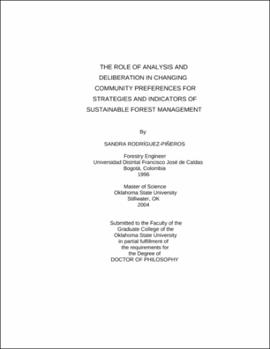| dc.contributor.advisor | Lewis, David K. | |
| dc.contributor.author | Rodriguez-Pineros, Sandra | |
| dc.date.accessioned | 2013-11-26T08:29:51Z | |
| dc.date.available | 2013-11-26T08:29:51Z | |
| dc.date.issued | 2009-07 | |
| dc.identifier.uri | https://hdl.handle.net/11244/7115 | |
| dc.description.abstract | Scope and Method of Study: | |
| dc.description.abstract | This research investigates changes in preferences for indicators of sustainable forest management, while a sustainable forest management plan is developed in a participatory process of analysis and deliberation (A&D). | |
| dc.description.abstract | A forestry community of 200 families in the State of Puebla, Mexico provided the venue for this research. The analysis of Q-methodology provided the basis for understanding subjective perspectives associated with forest management. Indicators of sustainable forest management were summarized in a survey to capture the difference in preferences before and after analysis and deliberation. | |
| dc.description.abstract | Findings and Conclusions: | |
| dc.description.abstract | A&D serves as a mechanism to incorporate values and preferences during planning; A&D also assures that the final outcome, as reflected by the adoption of a forest management plan, meets people's preferences, includes their values, and ensures that the indicators for SFM are fully understood and embraced. | |
| dc.description.abstract | This research presents a systematic procedure to involve both the people's values and forestry planning in analysis using Q-methodology. Q-methodology helped to identify viewpoints toward the forest that then were used to design a forest management plan to be discussed in the analysis. | |
| dc.description.abstract | This research demonstrates that ecological, economic, and social indicators of SFM at the local level are important because forest owners have a holistic view of the forest, which in turn is associated with the condition of the forest and cultural, spiritual, and traditional values. How indicators are perceived and implemented rest on the understanding of forestry concepts and the goals of management associated to benefits obtained from the forest. If the goals of management meet people's values and needs, SFM goals are more likely to be pursued. | |
| dc.description.abstract | More effort should be devoted to the development of forest management plans that include people's values and needs. | |
| dc.format | application/pdf | |
| dc.language | en_US | |
| dc.rights | Copyright is held by the author who has granted the Oklahoma State University Library the non-exclusive right to share this material in its institutional repository. Contact Digital Library Services at lib-dls@okstate.edu or 405-744-9161 for the permission policy on the use, reproduction or distribution of this material. | |
| dc.title | Role of analysis and deliberation in changing community preferences for strategies and indicators of sustainable forest management | |
| dc.contributor.committeeMember | Focht, William J. | |
| dc.contributor.committeeMember | Caniglia, Beth Schaefer | |
| dc.contributor.committeeMember | Stoecker, Arthur | |
| osu.filename | RodriguezPineros_okstate_0664D_10375.pdf | |
| osu.accesstype | Open Access | |
| dc.type.genre | Dissertation | |
| dc.type.material | Text | |
| thesis.degree.discipline | Environmental Science | |
| thesis.degree.grantor | Oklahoma State University | |
